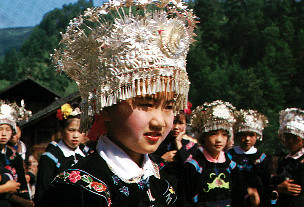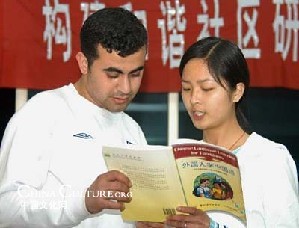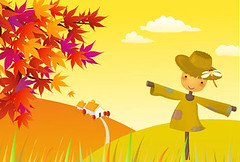Chinese Folk Worship is Popular Practice
Worship candles Folk worship is an ancient religious activity and forms an important part of folk-custom in China. There are numerous objects worshiped by people in ancient China. For example, there are some popular folk worship activities, such as worship of the God of Living Necessity, worship of ghost, worship of mountains & rivers and nature, worship of the
Funeral Custom in China
Funeral procession "Funeral" is a ritual for lamenting the deceased and the way to treat the remains. Funeral customs are very important to the Chinese. Funeral custom differs by time and location. Inhumation is very common. Usually the family members of the dead shall wear mourning dresses, which shall be made in different materials according to how close the
Presenting Hada-an Etiquette to Show Hospitality
Presenting hada Hada is a long piece of silk fabric used by the Tibetans and some Mongols as gift when greeting people, worshipping celestial beings, and in daily person-to-person contacts. According to literal record, hada was invented by the Han people before it found its way to Tibet. During the Yuan Dynasty, when the Tibetan Sakya King, Phags-pa,
Hangzhou Draws Your Attention to Annual Lantern Festival
Each year display of lanterns is a customary practice on Lantern Festival in Hangzhou city. As a tradition, preparation starts very early ahead of the Lantern Festival. Almost in every district of Hangzhou downtown, splendid lanterns of different colors and shapes will be showed to the public. As 2009 is the Chinese lunar year of Ox, lanterns with the image of ox become the theme of this Lantern
Water-splashing Festival of the Dai People
The three- to-four-day Water-Splashing Festival is a traditional festival for the Dai people in Xishuangbanna and other places to send off the old and welcome the new, and to wish each other well. Water splashing is featured activity on this occasion. Tourists and the Dai Ethnic girls indulge in water-splashing On the eve of the first day of the festival,
Lantern Festival Activities
Lanterns The Lantern Festival falls on the 15th day of the 1st lunar month, usually in February or March in the Gregorian calendar. As early as the Western Han Dynasty (206 BC-AD 25), it had become a festival with great significance. This day's important activity is watching lanterns. Throughout the Han Dynasty (206 BC-AD 220), Buddhism flourished in China. One
Spring Festival Greetings
The Chinese New Year is often accompanied by loud, enthusiastic greetings, often referred as Jíxiánghùa, or loosely translated as auspicious words or phrases. Some of the most common examples may include: Treasures fill the home! Business flourishes ! Peace all year round ! Wishing you prosperity! Harmony brings wealth! The country
Practices During Spring Festival
Rituals The celebration was traditionally highlighted with a religious ceremony given in honor of Heaven and Earth, the gods of the household and the family ancestors. The sacrifice to the ancestors, the most vital of all the rituals, united the living members with those who had passed away. Departed relatives are remembered with great respect because they were responsible for laying the
Festivities During Chinese Spring Festival
Days before Spring Festival Several days before Spring Festival, Chinese families give their home a thorough cleaning. It is believed the cleaning sweeps away bad luck of the preceding year and make way for good luck. Brooms and dust pans are put away on the first day so that luck cannot be swept away. Homes are often decorated with paper-cuts of Chinese auspicious phrases and couplets.
Origin of Chinese Spring Festival
Spring Festival lanterns The Chinese New Year is now popularly known as the Spring Festival because it starts from the Begining of Spring (the first of the twenty-four terms in coodination with the changes of Nature. Its origin is too old to be traced. Several explanations are hanging around. All agree, however, that the word Nian, which in modern Chinese solely means
Total: 52 Items This is 2 Page( 10 Items/Page) Result Page: 6 Pages First Previous Next LastArt
 more
moreU.S. space shuttle Discovery lifts
The space shuttle Discovery takes off from launch pad

Obama administration vows to break

Irving dual-language students
Melissa Reyna (center) and Johanna Sanchez

Dev, Denny to quizz for charity
Director Danny Boyle (R) holds his Oscar for

Custom
 more
moreProvinces Site
Chinese Medicine
 more
more
















